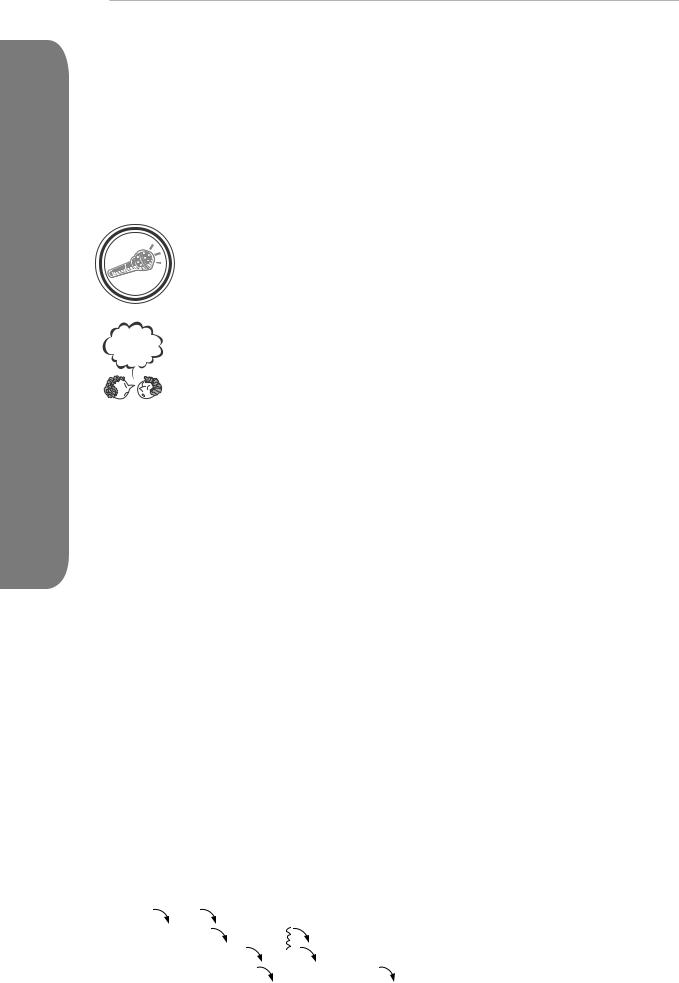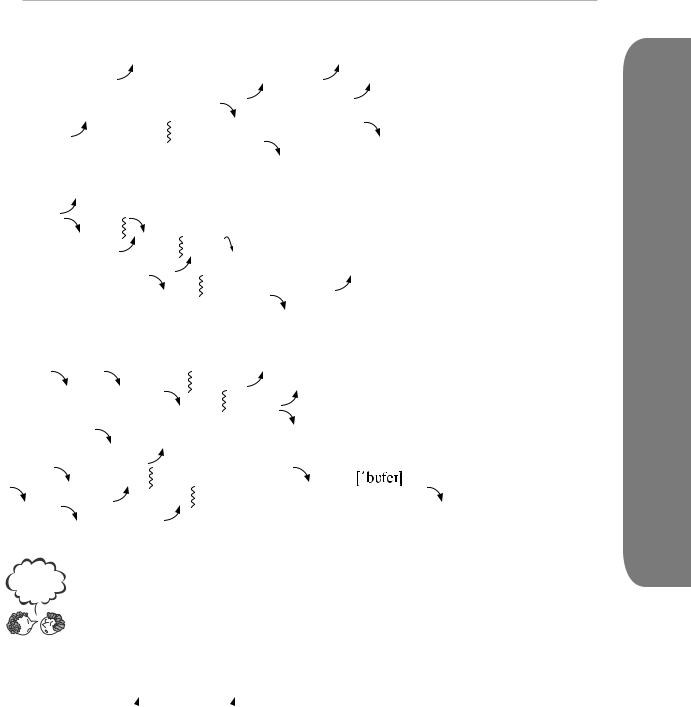
yastrebova_Part_1
.pdf
 Английский язык для международников и регионоведов. Часть I
Английский язык для международников и регионоведов. Часть I
4.help
a) ful |
b) less |
c) able |
5.love
a) able |
b) less |
c) ful |
6.enjoy
a) ful |
b) able |
c) less |
VII. VOCABULARY: THE BASICS. CHOOSE THE RIGHT WORD OR PHRASE TO MAKE THE SENTENCE MEANINGFUL.
1.George has bought a house in a safe and _________________ neighbourhood. (respected / respectable)
2.Both sides are interested in developing economic ___________________. (relations / relationships)
3.There’re two pages ___________________ from the book. (missing / absent)
4.Julia ____________________ the flat with another girl. (divided / shared)
5.We _____________________ the plane by 20 minutes. (missed / were late for)
6.Jessica's doctor ____________________ her against going to the south. (threatened / warned)
7.The place had changed so much that I could hardly ___________________ it. (recognise / admit)
8.As I listened to Professor Janes talk, a question ____________________ to me. (happened / occurred)
9.I don't like _________________ he always smiles at the wrong time. (how / the way)
10.William Rufus was so cruel that he was __________________ and hated by all his people. (feared / afraid)
11.The crowd had formed a circle around him at a ____________________ distance. (respectful / respectable)
12.Helping your kids with their homework can really help them __________________ at school. (go ahead / get ahead)
13.He ___________________ the train at the next stop and called 911. (got out of / got off )
14.Dale still hasn't _______________________ the defeat of his football team. (got over /got through)
15.This time you won't _______________________ your lies. (get away with / go away with)
VIII. VOCABULARY: THE PARTICULARS. CHOOSE THE RIGHT ANSWER TO COMPLETE THE SENTENCES.
1.People of good character are respectful __________ others.
a) to |
b) for |
c) of |
2.The Japanese had superiority ______ the air forces of the three Allied nations at the start of World War II.
a) to |
b) over |
c) above |
3.Bird flu poses a threat ___________ a growing number of countries.
a) to |
b) for |
c) towards |
4.Angela is ___________ her way home from a trip to Spain.
a) in |
b) by |
c) on |
5.The men showed no respect _____________ the rest of the passengers on board.
a) for |
b) of |
c) to |
6.The police easily recognised the criminal ____________ the clothes he wore.
a) from |
b) by |
c) for |
7.I felt very lonely at the concert tonight because I felt hostile _____________ the crowd.
a) to |
b) for |
c) before |
8.Young Saudis avoid travel ______________ fear of being mistaken for terrorists.
a) from |
b) because of |
c) for |
9.Then she really _______________ down to work and started cooking dinner.
a) went |
b) got |
c) fell |
Chapter 2. The Turbulent Present
103

Chapter 2. The Turbulent Present
 Английский язык для международников и регионоведов. Часть I
Английский язык для международников и регионоведов. Часть I
10. |
I am confident that I will get _______________ the exams with good marks. |
||
|
a) over |
b) through |
c) away |
11. |
I couldn’t _________________ through to my parents in New York as the line was busy. |
||
|
a) call |
b) go |
c) get |
12. |
I got ___________________ the taxi at the entrance to the hotel. |
|
|
|
a) off |
b) from |
c) out of |
IX. COMPLETE THE SENTENCES AS YOU SEE FIT.
1.Every bird likes ….
2.Birds of a feather ….
3.Every cloud has ….
4.Where there’s a will, ….
5.So many men, so ….
TOTAL: 100

UNIT 3
LAND OF PROMISE?

Chapter 2. Unit 3. Land of Promise?
 Английский язык для международников и регионоведов. Часть I
Английский язык для международников и регионоведов. Часть I
IN UNIT 3 YOU LEARN: |
LANGUAGE FOCUS |
to make small talk |
present tenses |
to ask for and give opinion |
articles with uncountable nouns |
how to say «извините» in English |
every, each, all |
to speak about present events |
phrasal verb “get” |
to read faster and |
|
to look for information |
|
SPEAKING 1. MAKING SMALL TALK (1)
Small talk (an informal conversation about things that are not important) is an essential part of social and business conversations.
PAIRWORK
1. Decide which topics are appropriate for small talk. Explain your decision to the class.
television; |
the latest films; |
gardening; |
classical music; |
cars; |
how much you make / salaries; |
sports; |
current events; |
the product you are selling; |
religion; |
your health problems; |
your family; children; |
fashion; |
weather; |
your boss; |
politics in general; |
political views; |
your work. |
2.Which of these do you think are important small talk tips?
•Have a few questions ready to get other people talking.
•Be the first to say ‘Hello’.
•Wear your best clothes.
•During introductions smile and always shake hands.
•Make an effort to remember the names of the people. And use them!
•Listen more than you talk.
•Do not give a lot of detail in casual conversation.
•Do not answer your mobile.
•If given a business card, have a look at it first, then put it away in your shirt pocket / purse / wallet.
•Be the first to exit from the conversation.
USEFUL PHRASES:
1. Conversation starters.
Talking about the weather:
'Isn’t it a 'lovely  day?
day?
'Beautiful |
day, |
isn’t it? |
|
|
|
What 'lovely / 'nice |
weather, |
isn’t it? |
|
||
It 'looks like it’s 'going to |
rain / |
snow. |
|
||
I 'hear they’re 'fore'casting |
thunderstorms / |
showers all weekend. |
|||
106

 Английский язык для международников и регионоведов. Часть I
Английский язык для международников и регионоведов. Часть I
Talking about current events: |
|
|
|
|
|
|||
Have you 'heard the |
news today / did you 'hear the |
news today? |
||||||
Have you 'heard / did you 'hear about the blackout / the |
floods etc.? |
|||||||
I 'hear they have 'opened a 'new exhi |
bition hall at the Tretyakov Gallery. |
|||||||
I 'read in the |
paper today |
they are 'going to 'build a 'new |
shopping mall. |
|||||
'What do you 'think about the 'new 'Stephen |
Spielberg film? |
|||||||
At a social event: |
|
|
|
|
|
|
|
|
Are you en |
joying yourself? |
|
|
|
|
|
||
'Pretty 'nice |
place, |
isn’t it? |
|
|
|
|
||
Have you 'tried their |
sushi? |
It’s de |
licious! |
|
|
|
||
Have you 'known the 'Browns |
long? |
|
|
|
|
|||
This 'dress 'suits you 'very |
well. Can I 'ask 'where you |
got it? |
||||||
How 'long have you been 'coming to this con |
vention (conference, workshop, etc.)? |
|||||||
2. “Exit lines”.
That’s my |
bus / |
train / etc. Must be going. |
|
||
They’ve just an'nounced my |
flight. Must be |
going. |
|
||
There are a 'few 'people here I 'haven’t 'said hel |
lo to yet. |
|
|||
I have to 'say hel |
lo to some people. |
|
|
||
Can I 'get you a / another |
drink? |
|
|
||
I 'skipped |
lunch today so I 'need to 'go to the |
buffet ( |
). |
||
Ex cuse me for a |
moment, I 'need to have a quick 'word with Mr. Smith. |
||||
Will you ex |
cuse me for a |
moment? |
|
|
|
PAIRWORK.
Match the conversation starters above with the right responses below.
Model:
A: 'Isn’t it a 'lovely  day?
day?
B:  Yes,
Yes,  'summer has
'summer has  come at last.
come at last.
A:I 'hear they have 'opened a 'new exhi  bition hall at the Tretyakov Gallery
bition hall at the Tretyakov Gallery
B: Have they?
Have they? 
 Well,
Well,  'that’s
'that’s  interesting.
interesting.
Oh, yes, it’s lovely.
Yes, spring / summer / etc. / has come at last.
Yes, we couldn’t ask for a better day, could we?
Looks like we are in for bad weather again.
Absolutely! (strong agreement)
Oh, I love it!
Yes, I know. They make the best sushi in town.
Yes, I think the party / reception / etc. is a great success.
It’s my first / second / etc. / time here.
I hardly know them, I’m afraid. A friend brought me here.
Oh, thank you. I bought it in GUM / Selfridges. / I’ve had it for years.
It’s fantastic. His best I think.
Chapter 2. Unit 3. Land of Promise?
107

 Английский язык для международников и регионоведов. Часть I
Английский язык для международников и регионоведов. Часть I
Haven’t seen it yet. I am not into the cinema, I am afraid.
Oh, no! How awful!
Yes, shopping malls are mushrooming here.
|
|
Practise saying the right thing. |
|
|
What would you say? Choose a more appropriate response/starter. |
||
of Promise? |
1. At a bus stop. |
||
A: We couldn’t ask for a better day, could we? |
|||
|
B: I feel it might rain, you know. / Yes, I quite agree with you. There isn’t a cloud in the sky. |
||
2. At the university café (lunch break). |
|||
3. Land |
A: It smells good. Do you often have lunch here? |
||
|
B: Now and then. It’s not all that good. / Whenever I have time for a proper meal. |
||
|
3. In the lift with a neighbour taking a new dog for a walk. |
||
Unit |
|
||
A: Hello. I see you have a new dog. Aren’t pets messy? / What a lovely puppy! What is his name? |
|||
|
B: It’s a bitch, actually. Don’t you like dogs? / Thank you. Molly is the name. It’s a she. |
||
2. |
|
||
|
|
|
|
Chapter |
4. Queuing at the library. |
||
A: It’s terribly hot here, isn’t it? / Is it always this slow ? They must be half asleep! |
|||
|
B: It always is at this time of the year. They really should install air conditioning. |
||
|
|
5. On a bench in the park. |
|
|
A: It’s so quiet and peaceful here, isn’t it? / It sure is nice here, right? |
||
|
|
B: I know. I love it at this time of the year. |
|
|
|
6. At the office. |
|
|
A: Hi, there! Are you new here? I haven’t seen you around before. |
||
|
|
B: Hi! I’ve only been here two months. I am in the Finance Department. |
|
|
A: Oh, you must make more money than I do. I am in Marketing. / Are you? It must be quite interesting. |
||
|
7. Two men are smoking in the lobby. |
||
|
A: Did you watch the match last night? |
||
|
|
B: No, I was working late. / I don’t care for sports. |
|
|
A: Too bad. It was a great game. |
||
|
|
B: What was the score? / It’s really a waste of time watching football. |
|
|
|
8. At a networking6 event. |
|
|
A: That overview that the Chairman gave was really good. |
||
|
|
B: Absolutely! Brief and to the point. / Yes, a bit longish to my taste. I enjoyed the entertainment part |
|
|
|
better. |
|
|
|
9. At a graduation party. |
|
|
A: What a huge party! Too noisy to my taste. / What a wonderful party! So many interesting people to |
||
|
|
meet. |
|
|
|
B: Yes, I know. / Yes, everyone is having a ball. |
|
|
|
|
|
|
|
6 установление (деловых) контактов, налаживание связей (конференция, собрание акционеров и пр.) |
|
108

 Английский язык для международников и регионоведов. Часть I
Английский язык для международников и регионоведов. Часть I
10. At the opera (at your business partner’s invitation).
A:How do you like it? What do you think of Gergiev?
B:Oh, it is fantastic. He is a man of genius. / It’s good I suppose if you like that sort of thing.
PAIRWORK.
Start a conversation (a) and develop it (b) using the following hints:
Do’s and Don’ts
Maintain eye contact. Smile.
Keep to ‘safe’ topics (weather, current events, entertainment, sports news). No negative comments.
No personal remarks.
If you talk to people you’ve already met, try to remember what their interests are (sport, music, gardening, etc.).
Maintain an appropriate distance from the person you are talking to (at arm’s length at least).
Situations:
At the International Forum:
Moscow Model of the European Union. MGIMO-University. Welcome Party:
1.You are a first-year student; you hardly know anyone and feel uncomfortable standing by yourself. Start a conversation with another student in a similar situation.
2.It’s your second time at such a forum and you’ve met some people. Speak to one of them. A possible start: ‘Hello. Mark Fisher? Ivan Borisov — good to see you again.’
3.You are a post-graduate. You want to meet Jane Blake, a researcher from Glasgow University. Get someone to introduce you and start a conversation.
4.A participant you sat next to at the opening session is all by herself. Start a conversation.
At the airport. You’ve checked in, but the flight is delayed. Speak to a person waiting for the same flight.
At the Euritanian Embassy. Waiting for your turn to submit your papers. The guard at the door seems friendly. Say something nice to him.
At a hall of residence in Brighton. You’ve come to a summer language school. You are waiting for a room. Talk to the girl at the reception.
INTEGRATING SKILLS
Role-play. Make up dialogues appropriate in the situations below. Make use of speech patterns from the Introducing and Greeting People section (see Unit 1), conversation starters and exit lines.
A Christmas party for students and teachers at the Goethe Institute, Moscow. As one of the people doesn’t speak German, speak English!
Roles:
Barbara, a German teacher at the Goethe Institute, Glasgow;
Jenny, her friend, who does not speak any German;
Chapter 2. Unit 3. Land of Promise?
109

Chapter 2. Unit 3. Land of Promise?
 Английский язык для международников и регионоведов. Часть I
Английский язык для международников и регионоведов. Часть I
Frank, a programme manager from Berlin;
Tatyana, a German teacher at the Goethe Institute in Moscow;
Elena, a technical university graduate preparing for Oberstuffe exam;
Michael, a second-year student at MGU doing his first German course;
Boris, a young businessman, a student on the Business German Course.
Ideas for role-plays:
coffee break at a conference; networking event;
waiting for the train; on the train;
at a birthday party.
ИЗВИНИТЕ: SORRY, EXCUSE ME, I BEG YOUR PARDON
Situation 1. Извините, виноват(а). |
|
|
|||||
Formal: I 'beg your |
pardon. |
|
|
|
|||
Neutral: I |
am sorry. I am |
very / awfully |
sorry. Ex |
cuse me. |
|||
Informal: I am |
sorry. |
Sorry. |
|
|
|||
Situation 2. Извините, что вы сказали? |
|
|
|||||
Formal: I 'beg your |
pardon / |
Pardon? |
|
|
|||
Neutral: I am |
|
sorry? Ex |
cuse me? (Am.E) |
|
|
||
Informal: |
Sorry? |
|
|
|
|
|
|
Situation 3. Извините, не могли бы Вы … (attracting attention).
Formal: Could I just  trouble you for a moment?
trouble you for a moment?
Neutral: Ex  cuse me. I am
cuse me. I am  sorry.
sorry.
Informal:  Sorry.
Sorry.
Note:
When you are unhappy or ashamed about what you have done use I am sorry. The same phrase is used to express sympathy with someone in a difficult situation.
When you want to apologize for a slight mistake use Excuse me or I beg your pardon (fml). When you want to ask smb to move to let you pass, etc. use Excuse me.
A polite answer to an apology is It’s all right / That’s all right / No problem.
Practise saying the right thing.
Match the dialogues with the situations above and read them aloud using the right tone. Learn them by heart.
1.A: I never expected you to let me down!
B:I am sorry.
2.A: Excuse me! I need to get off at the next stop.
B:Sorry. There is a suitcase blocking the way.
110

 Английский язык для международников и регионоведов. Часть I
Английский язык для международников и регионоведов. Часть I
3.A: That Pilcher woman is going out with your nephew!
B:I am sorry. I didn’t quite catch what you said.
4.A: Have you brought the papers?
B:Sorry! I guess I left them at home.
5.A: The director has decided to sack (уволить) ten workers in your department.
B:I beg your pardon? It’s so noisy here!
6.A: You used my mobile again!
B:I am awfully sorry. Mine is temporarily blocked.
7.A: I want this report on my desk by noon!
B:Sorry, I don’t think I can do it in one hour!
8.A: Excuse me! Can you tell me the way to the Zoo?
B:Sorry. I’m afraid I don’t know. (I didn’t know we had a zoo!)
9.A: I booked tickets for Toska last Wednesday. My name is Bergkamp.
B:I’m sorry, what was your name again?
10.A: I got the letter today. I failed to get the grant again!
B:I am so sorry.
What would you say?
Fill in the gaps. If in doubt, consult Appendix.
At a restaurant.
Customer: ______ . The meat is rare (с кровью) and I asked for medium!
Waiter: ______________. I’ll change it.
On the bus.
Passenger:_______. What is the next stop?
Driver: Kensington Gardens.
Passenger: __________ ?
Driver: KENSINGTON GARDENS!
At the newsagent’s.
Customer: _______ . Do you have a 5-pound international calling card?
Newsagent: ______. We only have 10-pound ones.
Customer: Can you change a five-pound note?
Newsagent: ______. I don’t have any small change.
At the theatre. The curtain is about to rise.
A:_______. I hate to bother you. My seat is right in the middle.
B:That’s all right.
A: _______. I am afraid this is my seat.
C: _______. I thought nobody was coming.
Chapter 2. Unit 3. Land of Promise?
111

Chapter 2. Unit 3. Land of Promise?
 Английский язык для международников и регионоведов. Часть I
Английский язык для международников и регионоведов. Часть I
At the bar.
A:It’s your round, Jiggs, isn’t it?
B:______, I thought we were going Dutch.
At the ticket office.
A:Good morning. I’d like a second-class ticket to Glasgow for the ten o’clock train tomorrow.
B:________. Only first class is left. You can take the ten-fifty train.
A:________?
B:There are second-class tickets for the TEN-FIFTY TRAIN.
A couple talking.
A: ________. I can’t go out tonight.
B:_________. I thought you said you were free tonight.
A:I know I said that. But Mum called to say Dad was taken to hospital.
B:_________. I’ll ring you up tomorrow then.
At the corner of the street.
A:_______. Do you have the time?
B:________. My watch is fast. It must be around 11.
Role-play. Make up dialogues appropriate in the situations below.
1.It’s lunch time and the restaurant is full. You want to pay your bill and you have been trying to attract the attention of the waiter for some time now.
2.You are at the airport. Your fellow-traveller can’t make out the announcement about the delay of your flight and keeps asking you to repeat it.
3.The professor insists you hand in your term paper next week. However, you distinctly remember the deadline is in two weeks' time.
4.You pushed an old man when getting on the bus.
5.You are trying to book a room at a hotel in Edinburgh for the next week-end. The receptionist can’t write your name correctly.
6.At the shop. You want to change the shoes you bought because they turned out to be navy, and you wanted a black pair.
7.You ring up a friend to have a chat. She tells you yesterday was her birthday (you didn’t send her a birthday card or phone).
8.You have just arrived at a small seaside town. You are trying to find your hotel. The people you ask are all strangers there.
SPEAKING 2. STATING OPINION
AND ASKING FOR OPINION (1)
A FEW WORDS ON INTONATION AND STRESS
Apart from pronunciation, stress and rhythm are equally important for communication. A statement is normally pronounced with the falling tone on the Tonic (the syllable of the greatest stress). What is more, the voice rises slightly on each stressed syllable and then falls slightly below the pitch (уровень тона) it was at before.
112
